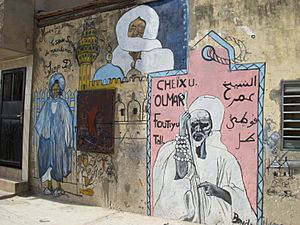Omar Saidou Tall facts for kids

El Hadj Omar Tall (also known as Umar ibn Sa'id al-Futi Tal) was an important leader in West Africa. He was born around 1794 in what is now Senegal and passed away in 1864. Omar Tall was a respected Islamic scholar, a Sufi teacher, and a strong military commander from the Toucouleur group.
He founded the Toucouleur Empire, which was powerful for a short time. This empire covered large parts of modern-day Senegal, Guinea, Mauritania, and Mali.
Contents
Who Was El Hadj Omar Tall?
Omar Tall's name can be spelled in different ways, like Omar, Umar, Tall, Taal, or Tal. The title El Hadj means he successfully completed the Hajj, a special journey to Mecca that Muslims make.
He also earned other important titles, like Amir al-Mu'minin (Leader of the Believers) and Khalifa (Successor). These titles showed his high standing and authority among his followers.
Omar Tall's Early Life and Journey
Omar Tall was born around 1794 in a place called Halwar, in what was then the Imamate of Futa Toro (modern-day Senegal). He was one of twelve children.
He studied at a religious school before going on his Hajj to Mecca in 1828. When he returned in 1830, he was known as El Hadj. He became a leader in the Tijaniyya Sufi brotherhood, which gave him great influence.
After his Hajj, Omar Tall traveled and met important people. He stayed in Sokoto from 1831 to 1837 and even married a daughter of the Fula Caliph. In 1840, he moved to Dinguiraye, in present-day Guinea. There, he started preparing his army for a holy war, known as a jihad. His army grew to about 50,000 soldiers, equipped with French weapons.
In 1852, he announced his jihad. He aimed to unite different groups under Islamic rule and challenge local leaders and European influence. Omar Tall believed that people should follow a spiritual guide who had a direct connection to divine truth.
Expanding the Toucouleur Empire
Omar Tall's movement attracted many people, especially those who felt they didn't belong elsewhere. They found a new purpose and identity under his leadership. His jihad began with the conquest of Futa Toro. By 1862, his empire included important cities like Timbuktu, Masina, and Segu.
In 1848, his army, using French weapons, successfully took over several neighboring regions. He built a tata (a type of fort) near the city of Kayes in Mali, which is now a popular place for visitors.
In 1857, Omar Tall fought against the Khasso kingdom and the French, who were trying to control trade along the Senegal River. He tried to capture the French colonial fort at Medina. However, the French governor, Louis Faidherbe, arrived with more soldiers, and Omar Tall's siege failed. In 1860, Omar Tall made a deal with the French. This agreement recognized his control over Futa Toro and gave him power over the Bambara states of Kaarta and Segu.
Conquests in Bambara and Masina
After failing to defeat the French, Omar Tall focused on the Bambara kingdoms. His army quickly took over the capital of Kaarta, Nioro du Sahel. Then, on March 10, 1861, they captured Ségou. The king of Segu, Ali Diara, fled.
Omar Tall then turned his attention to other Islamic states in the region. He placed his son, Ahmadu Tall, as the leader in Segu. Omar Tall then marched along the Niger River to the Massina Empire. More than 70,000 people died in the battles that followed. The city of Djenné fell quickly, and the capital of Hamdallahi was destroyed in May 1862.
Omar Tall's Final Years and Legacy
In 1862, Omar Tall and his followers invaded the Massina Empire again. However, a leader named Ahmad al-Bakkai al-Kunti formed a group of local states to fight back. This group included Masina and Timbuktu.
Omar Tall captured Hamdullahi on May 15, 1862. He then tried to take Timbuktu but was pushed back by a combined force of Tuaregs, Moors, and Fulas in 1863. During this time, Omar Tall's army suffered several defeats, and some of his generals were killed.
A rebellion also started in the Masina lands, led by Ba Lobbo. In 1863, Omar Tall recaptured Hamdullahi, but Balobo's forces surrounded his army there. Balobo's followers captured Hamdallahi in February 1864. Omar Tall escaped to a cave in Degembere, where he died on February 14, 1864.
Omar Tall's nephew, Tidiani Tall, became the next Toucouleur emperor. His son, Ahmadu Tall, worked hard to keep the empire together from Segu. However, the French continued to expand their control, eventually taking Segu in 1890. Omar Tall's empire was eventually absorbed into the larger French West African empire.
Omar Tall is still an important figure in Senegal, Guinea, and Mali. In Senegal, many remember him as a hero who resisted the French. However, in Mali, some see him as an invader who weakened West Africa, making it easier for the French to take over.
Omar Tall also appears in the historical novel Segu by Maryse Condé. He remains a key figure in the Tijaniyya and other reform movements that emphasize strict Islamic practices. His state banned things like dancing, tobacco, alcohol, and the worship of idols. He replaced old taxes with Islamic taxes like zakat. He also limited men to four wives.
In November 2019, the French government returned a sword, which was believed to be Omar Tall's, to Senegal. It was later found to belong to his son, Ahmadu Tall.
Lineage of Leadership
| Preceded by none |
Leader of the Toucouleur Empire 1850–1864 |
Succeeded by Ahmadu Tall |
| Preceded by Bamana Empire |
Faama of Ségou 1861–1864 |
Succeeded by Ahmadu Tall |
See also
 In Spanish: El Hadj Umar Tall para niños
In Spanish: El Hadj Umar Tall para niños
 | Kyle Baker |
 | Joseph Yoakum |
 | Laura Wheeler Waring |
 | Henry Ossawa Tanner |

